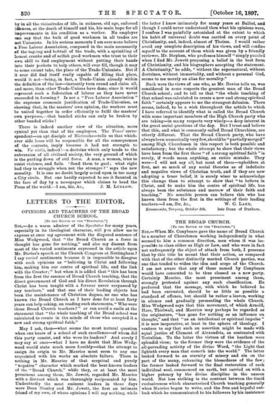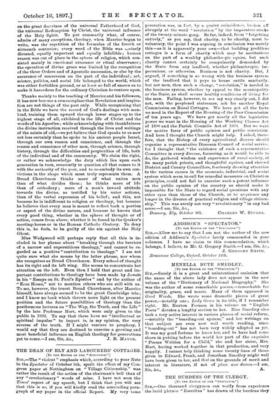THE BROAD CHURCH.
LTO THE EDITOR OF THE "SPECTATOR."]
Sin,—When Mr. Conybeare gave the name of Broad Church to a number of Churchmen working independently in what seemed to him a common direction, men whom it was im- possible to class either as High or Low, and who were in fact not unfrequently the object of attack from both, I presume that by this title he meant that their action, as compared with that of the other distinctly marked Church parties, was one that tended to widen the idea and scope of the Church. I am not aware that any of those named by Conybeare would have consented to be thus classed as a new party. Certainly Maurice, the most prominent among them, strongly protested against any such classification. He preferred that the message, with which he believed he had been entrusted, should be as little as possible a standard of offence, but should be rather a leaven, working in silence and gradually permeating the whole Church. Miss Wedgwood says that this movement, of which Arnold, Hare, Thirlwall, and Maurice may perhaps be regarded as the originators, "has gone for nothing as an influence on thought," and that "as an intellectual or spiritual impulse" it is now inoperative, at least in the sphere of theology. I venture to say that such an assertion might be made with equal justice of Clement of Alexandria, as contrasted with Tertullian. To the latter the virtues of the heathen were splendid vices; to the former they were the evidence of the all-pervading activity of the divine Word, "the Light that lighteth every man that cometh into the world." The latter looked forward to an eternity of misery and sin on the part of the many, enhancing the blessedness of the few ; the former looked forward to the final restoration of each individual soul, commenced on earth, but carried on with a higher potency by the divine discipline in the unseen world. Not less striking is the contrast between the timid exclusiveness which characterised Church teaching generally when Maurice began to write, and the free and hopeful out- look which he communicated to his followers by his insistence
on the great doctrines of the universal Fatherhood of God, the universal Redemption by Christ, the universal influence of the Holy Spirit. To put summarily what, of course, admits of many exceptions, theology, when Maurice began to write, was the repetition of the formulas of the fourth or sixteenth centuries; every word of the Bible was uivinely dictated, equally important and equally infallible; human reason was out of place in the sphere of religion, which con- sisted mainly in emotional utterance or ritual observance ; the operation of divine grace was limited by the recognition of the three Orders and of Apostolic succession, or else by the assurance of conversion on the part of the individual ; art, science, politics, and social life belonged to the world, which was either forbidden ground, or at least so full of snares as to make it hazardous for the ordinary Christian to venture upon.
Thanks mainly to the teaching of Maurice and his followers, it has now become a commonplace that Revelation and inspira- tion are not things of the past only. While recognising that in the Bible we have the record of God's dealings with man- kind, training them upward through lower stages up to the highest stage of all, exhibited in the life of Christ and the words of his Apostles ; while acknowledging with thankfulness the divine instruction received through the lives and writings of the saints of old,—we yet believe that God speaks to us now not less certainly than he spoke to his ancient people Israel, through our own reason and conscience, and through the reason and conscience of other men, through science, through history, through the difficulties and perplexities of life, both of the individual and of the community. We claim the right, or rather we acknowledge the duty which lies upon each generation in turn, reverently to question all that comes to it with the authority of the past, and to re-embody its own con- victions in the shape which most truly represents them. A Broad Churchman thinks more of what unites men than of what divides them ; he thinks more of life than of orthodoxy ; more of a man's inward attitude towards the divine, as testified by his outer actions, than of the verbal expression of his belief ; and this, not because he is indifferent to religion or theology, but because he believes that every man is meant to reflect back a portion or aspect of the divine nature, and because he knows that every good thing, whether in the sphere of thought or of action, comes from above, whether it be found in the Quaker's meeting-house or in the Roman Catholic Oratory. To deny this is, he feels, to be guilty of the sin against the Holy Ghost.
Miss Wedgwood will perhaps reply that all this is in. eluded in her phrase about "breaking through the barriers of a narrow and superstitious theology," and cannot be re- garded as a positive "contribution to theology." I am not quite sure what she means by the latter phrase, nor whom she recognises as Broad Churchmen. Every school of thought has its right and its left wing. She seems to concentrate her attention on the left. Even then I hold that great and im- portant contributions to theology have been made by Jowett in his "Essays on St. Paul's Epistles" and by the author of "Ecce Homo," not to mention others who are still with us. To me, however, the truest Broad Churchmen, after Maurice himself, have always seemed to be the great Cambridge trio ; and I know no book which throws more light on the present position and the future possibilities of theology than the posthumous lectures on "The Way, the Truth, and the Life" by the late Professor Hort, which were only given to the public in 1893. To say that these have no "intellectual or spiritual impulse" to impart is, in my opinion, the very reverse of the truth. If I might venture to prophesy. I would say that they are destined to exercise a growing and most beneficial influence on English theology for generations







































 Previous page
Previous page